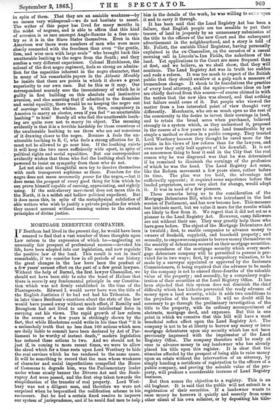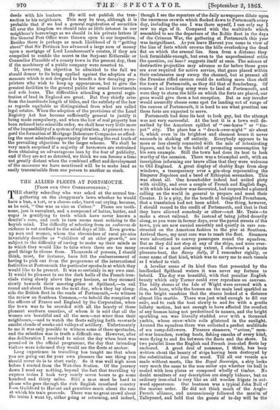MORTGAGE DEBENTURE COMPANIES.
IF Bentham had lived in the present day, he would have been I amazed to find that a vast number of those thoughts upon Law reform to the expression of which he—neglecting an unusually fair prospect of professional success—devoted his life, have been adopted into our legislation, and now regulate the positive law of the land. This result is not in itself remarkable, if we consider how in all periods of our history the great changes in the law have been the product of a few years' earnest effort on the part of a few great lawyers. Without the help of Burnel, the first lawyer Chancellor, we should not have been able to echo the boast of Hallam that there is scarcely any fundamental principle in our Constitu- tion which was not firmly established in the time of the Plantagenets, Edward I. would never have won the title of the English Justinian if he had not had his Tribonian. So in later times Bentham's exertions about the state of the law would have passed away without much effect, if Romilly and Brougham had not lived to use their intellectual force in carrying out his views. The rapid growth of law reform in the course of a few years is strikingly shown by the fact, that while Blackstone could write in his time that "it is a melancholy truth that no lees than 160 actions which men are daily liable to commit have been declared by Act of Par- liament to be worthy of instant death," modern legislation has reduced these actions to two. And we should not be just if, in coming to more recent times, we were to allow the cloud which for a time rests upon Lord Westbury to hide the real services which he too rendered to the same cause. It will be something to record that the man whose weakness of character and social imperfections compelled the House of Commons to degrade him, was the Parliamentary leader under whose steady banner the Divorce Act and the Bank- ruptcy Act were passed, and the first step taken towards the simplification of the transfer of real property. Lord West- bury was not a diligent man, and therefore we were not surprised when he bequeathed the codification scheme to his successors. But he had a certain fixed resolve to improve our system of jurisprudence, and if he could find men to help him in the details of the work, he was willing to enter upon it and to carry it through.
It has been said that the Land Registry Act has been a failure, that English people are too sensible to put their tenure of land in jeopardy by an unnecessary submission of the title to the officers of the new Court and the subsequent advertisement in the neighbourhood, and a story is told of Mr. Follett, the amiable Chief Registrar, having personally explained to the ex-Chancellor, on the occasion of a casual morning call in Lincoln's,. Inn Fields, the nakedness of the land. Yet applications to the Court are more frequent than at first, and we believe, as we shall show, that they will continue. The Land Registry Act was in truth too sudden and rude a reform. It was too much to expect of the British public that they should swallow at a gulp such a measure of tremendous change. It shook to its foundations the practice of every local attorney, and the squire—whose ideas on law are chiefly derived from this source—of course chimed in with the notion that the new idea was absurd, and that nothing but failure could come of it. But people who viewed the matter from a less interested point of view thought very differently. Merchants, who are as much open as the rest of the community to the desire to invest their earnings in land, and to retain the broad acres when purchased, believed strongly in a system which, as they understood it, proposed in the course of a few years to make land transferable by as simple a method as shares in a public company. They trusted Lord Westbury because they thought he cared more for the publics in his views of law reform than for the lawyers, and even now they only half approve of his downfall. It is not an uncommon thing to hear it said in the City that the real reason why he was disgraced was that he was determined if he remained to diminish the earnings of the profession of which he was the head. The Land Registry Act came, like the Reform movement a few years since, rather before its time. The plan was too bold, the advantage not sufficiently apparent ; it required some experience before the landed proprietors, never very alert for change, would adopt it. It was in need of a few pioneers.
These remarks bring us to the consideration of the Mortgage Debentures Bill, which was introduced in the last session of Parliament, and has now become law. This measure has intrinsic merit, but we value it more for the results which are likely to flow from it. We regret that it did not act as a pioneer to the Land Registry let. However, camp followers are not without their use. They may greatly help those who have gone before. The object of the Mortgage Debentures Act is twofold ; first, to enable companies to advance money to owners of freehold, copyhold, and leasehold property; and secondly, to empowercompanies to borrow money themselves on the security of debentures secured on their mortgage securities.
The soundness of the mortgage security which every mort- gage debenture company will be permitted to possess is pro- vided for in two ways; first, by a compulsory valuation, to be made by a surveyor appointed or approved by the Inelosure Commissioners, it being required that the advance to be made by the company is not to exceed three-fourths of the saleable value of the property ; and secondly, by a compulsory regis- tration of their securities at the Land Registry Office. It has been objected that this system does not diminish the chief difficulty which has hitherto prevented the ready advance of money upon a land security, while it adds two conditions to the prejudice of the borrower. It will no doubt still be necessary to go through the preliminary investigation of the title to the property, with its ordinary accompaniment of abstracts, mortgage deed, and expenses. But this is one point in which we conceive that this Bill will have a most beneficial reflex effect upon the Land Registry Act. The company is not to be at liberty to borrow any money or issue mortgage debentures upon any security which has not been previously impressed with the imprimatur of the Land Registry Office. The company therefore will be ready at once to advance money to any landowner who has already placed his title upon this register. It is clear that the stimulus afforded by the prospect of being able to raise money upon an estate without the intervention of an attorney, by simply handing a certificate of registration to the officers of a public company, and proving the saleable value of the pro- perty, will produce a considerable increase of Laud Registry business.
But then comes the objection to a registry. This is an old bugbear. It is said that the public will not submit to a
registration of their securities. If a landowner wants to raise money he borrows it quietly and secretly from some other client of his own solicitor, or by depositing his title- deeds with his bankers. He will not publish the tran- saction to his neighbaurs. This may be true, although it is probable that if we had a general registration of securities all over the kingdom we should take as little interest in our neighbour's borrowings as we should in his private letters if the General Post Office were thrown open to our inspection. Besides there is perhaps as much likelihood of it "getting about" that Sir Pertinax has advanced a large sum of money upon a mortghge of Lord Lumbereourt's estates, if they are compelled to confide the secret te the Serjeant Eitherside or Counsellor Plausible of a county town in the present day, than if the machinery of a public company were resorted to.
If, however, the objection be admitted to the full we should demur to its being applied against the adoption of a measure which is not designed to benefit a few decaying pro- prietors who wish to keep up appearances, but to give the greatest facilities to the general public for sound investments and safe loans. The difficulties attending a general regis- tration of land in England are great. But they chiefly arise from the inordinate length of titles, and the subtlety of the law as regards equitable as distinguished from what are called legal estates. When the adoption of the provisions of the Land Registry Act has become sufficiently general to justify it being made compulsory, and when the law of real property has been reduced into scientific order, we shall hear very little more of the impossibility of a system of registration. At present we re- gard the formation of Mortgage Debenture Companies as afford- ing the most admirable opportunity for testing the real truth of the prevailing objections to the larger scheme. We shall be very much surprised if a majority of borrowers are restrained from obtaining an advantageous loan by the fear of publicity, and if they are not so deterred, we think we can foresee a time not greatly distant when the combined effect and development of the measures we have mentioned will be to make land as easily transmissible from one person to another as stock.































 Previous page
Previous page